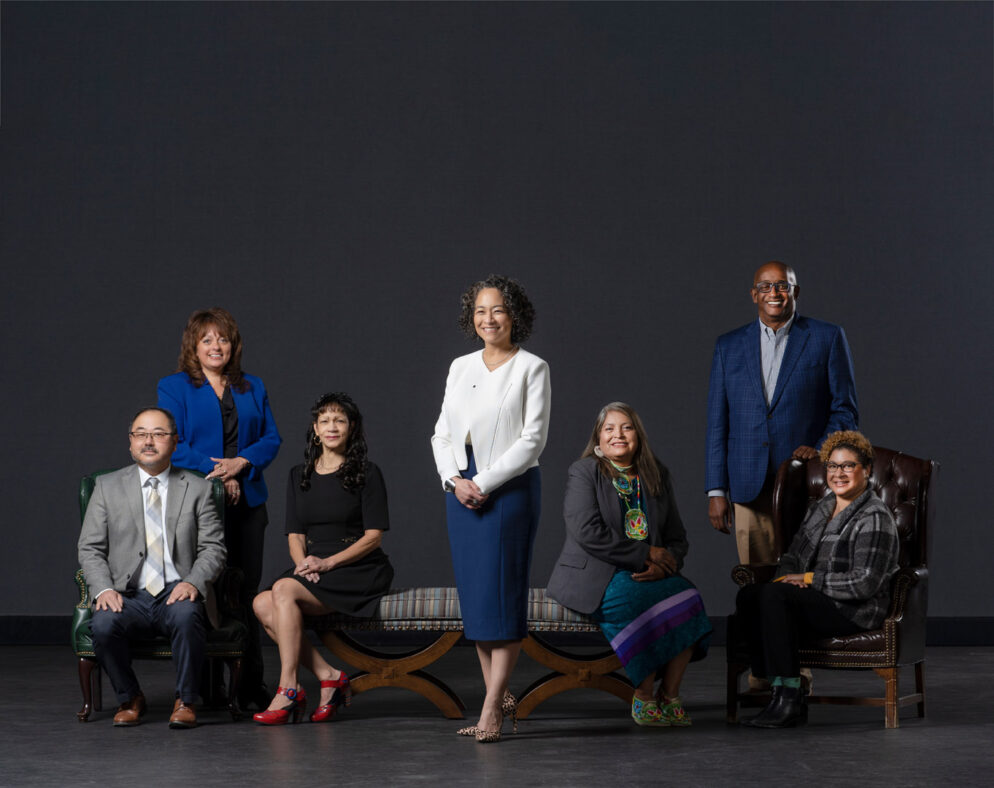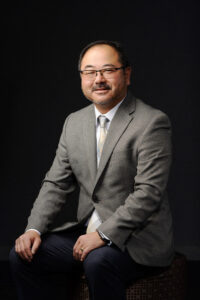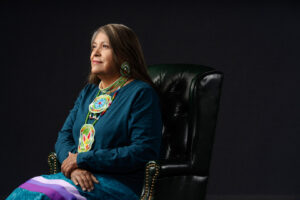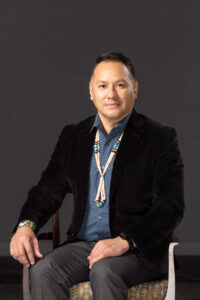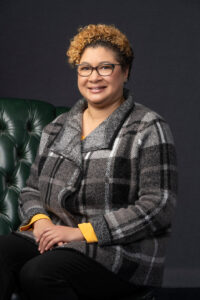Black, Indigenous, people of color, and women now hold more influential positions than ever before at Colorado College. Hear from some leaders about how we’re doing, where we go from here, and what the experience has been like for them.
Photos by Lonnie Timmons III
Jump to Web Extras for this story
What experiences have you had as a BIPOC person in a leadership position here at CC?
“In my field, I did not have any older role models that looked like me or shared similar identities. Student Affairs and Housing were not fields a lot of Asian Americans went into during the late 1980s. I have had to learn how to incorporate my true self into my leadership style over the decades and continue to work on being a better leader […] building a trusting environment is the key.”
Edwin Hamada
Assistant Vice President for the Residential Experience
What lessons from your heritage do you bring to the college, a primarily white institution?
“An ancestor once said he lived in two worlds. I also live in two worlds, the Native American/Indigenous community and society at large. When I walk through the door of this institution, I walk in with both worlds. I strive to stay true to myself in my cultural teachings and traditions, but it is important to bring both perspectives to my position. Education is power. Being part of CC is allowing me to be a lifelong learner. The more knowledge I gain, the more helpful I can be.”
Debbie Howell (Pawnee/Dakota)
Native American Elder-in-Residence, Office of the Chaplain
CC now has more BIPOC and women in leadership positions than ever before. What is your take on that? How do you see these changes?
“It speaks to the moment. CC is responding to the hour, what is going on in the country and around the world. The U.S. has always been a leading force in what is going on, so it’s apropos. The #MeToo and Black Lives Matter movements started here […] it disseminates around the world and shapes the world. It’s fantastic.”
Frieda Ekotto ’86
Colorado College Trustee, Associate Chair and Professor of Afroamerican and African Studies, and Comparative Literature and Francophone Studies at the University of Michigan
What experiences have you had as a BIPOC person in a leadership position here at CC?
“One of the experiences I have encountered is the stigma about one’s ability to handle additional responsibility as a BIPOC woman. It is important to have mentors who believe in your vision and abilities and allow you the autonomy to rise in the organization. In my Colorado College career, I have been fortunate to have those supervisors to which I am extremely grateful for the opportunities.”
Brenda Soto
Director of College Events and Interim Director of Alumni and Family Relations
Any notable experiences you have had as a BIPOC person in a leadership position here at CC that you would like to relate?
“I often imagine BIPOC students being in predominately white spaces and wondering if they feel like they truly belong at CC. This is what sparked the idea to rename a space on campus for Indigenous Peoples because none had yet existed on campus. To my amazement, and through college-wide support, the Board of Trustees unanimously approved this request. The following Homecoming, we invited members of the Ute Tribes to bless the newly named quad space, present cultural knowledge to classes, and to perform traditional dances during the weekend picnic. It was the proudest day of my time at CC.”
Felix Sanchez ’93 (Diné)
Assistant Vice President for Communications
What experiences have you had as a BIPOC person in a leadership position here at CC?
“I lead change and transformation efforts across campus with a particular focus on faculty, academic staff, and our co-curricular and curricular programs. There is no playbook for what we are trying to do in terms of becoming an antiracist institution that I can use in my work. I must be creative, innovative, and take risks as I try different strategies of supporting and leading change. My biggest challenge is having the time for the type of thinking and imagining that is needed for strategic planning along with providing on-the-ground support to my colleagues […] in the form of being a thought partner, solution generator, and guide.”
Peony Fhagen,
Senior Associate Dean of Equity, Inclusion, and Faculty Development, Director of the Crown Faculty Center, Director of the Bridge Scholars Program, Associate Professor of General Studies
What challenges do we as a college face regarding hiring and retaining BIPOC leaders?
We still find that overall women of color are paid less than their male and white counterparts for the same work. We are accustomed to the narrative that “women make .70 for every $1 that a man makes, but we rarely acknowledge the disparities that arise when we disaggregate that information. For example: Asian women (87%); white, non-Hispanic women (79%); Black women (63%); Native Hawaiian and other Pacific Islander women (61%); and Latinx/e, American Indian and Alaska Native women (57%).
Rosalie M. Rodriguez
Senior Associate Dean of Students, Diversity, Equity and Inclusion, Director of the Butler Center
Web Extras
Rosalie M. Rodriguez, Senior Associate Dean of Students, Diversity, Equity and Inclusion, Director of the Butler Center
The Bulletin: CC now has more BIPOC and women in leadership positions than ever before. What is your take on that? How do you see these changes?
Rosalie Rodriguez: I think this is a natural progression of trends we are seeing in higher education as a whole, and also a direct result of a campus that has taken proactive steps to affirm its commitment to equity and justice. As a whole, the U.S. has seen a sharp upward trend in college degree completion for women of color that has not been mirrored by men of color nor by white people of all genders. In particular, the National Center for Education statistics show that Black women are the most educated demographic in the U.S., with college enrollments that exceed percentages for other groups, including white women, Asian women, and white men. When you couple this information with our commitment to remove barriers and open doors that have traditionally been closed, especially in senior leadership, we should expect to see BIPOC women who have experience and are ready to walk through them.
The Bulletin: What challenges do we as a college face regarding hiring and retaining BIPOC leaders?
Rosalie M. Rodriguez: We still find that overall, women of color are paid less than their male and white counterparts for the same work. We are accustomed to the narrative that “women make .70 for every $1 that a man makes, but we rarely acknowledge the disparities that arise when we disaggregate that information. For example: Asian women (87% or .87); white, non-Hispanic women (79% or .79); Black women (63% or .63); Native Hawaiian and other Pacific Islander women (61% or .61); and Latinx/e, American Indian, and Alaska Native women (57% or .57).
A brief personal example of how ingrained this understanding of who gets paid what and who does what jobs: About seven to eight years ago, I applied for a job at a large, well-known university with a fairly good reputation for equity and justice. There was an issue with being able to access my application through their online portal and so I reached out to IT. Without even a second glance they gave me full access to another person’s account — a Rosa Rodriguez who was part of the custodial staff. I could see this person’s Social Security number, performance evaluations, pay stubs, everything. When I reached out to let them know about the error, it was blown off like it wasn’t a big deal. This told me so much about their biases, but also about their lack of respect for the individual whose information they gave me access to.
In addition, people of color, especially feminine-identified BIPOC, shoulder a disproportionate amount of the invisible labor that is done on college campuses. This includes unofficially mentoring and advising BIPOC students and junior colleagues, serving on ad-hoc committees for DEIA (diversity, equity, inclusion, and accessibility) that are not counted toward tenure and promotion, as well as educating white colleagues about issues that BIPOC folks face. We saw a significant uptick in this kind of work after the deaths of George Floyd, Ahmaud Arbery, and Breonna Taylor. During a time when many BIPOC individuals, especially Black folks, really needed to carve out space for their own mental health and be in community with folks who would understand the impact these events took on their well-being, instead, many college campuses turned to them as they scrambled to make statements about their commitment to DEIA work, asked them to be emotional supports for BIPOC students, and often to assuage the feelings of white co-workers seeking validation that they were not also a part of the problem.
Lastly, a major challenge that many BIPOC individuals in leadership face is the lack of experience people, including BIPOC, have with BIPOC leadership. This can show up as microaggressions like a parent asking to talk to the dean or the chair and when a Black woman is standing in front of them, insisting that they are looking for the person in charge — i.e., someone white. It can also show up in lower teaching evaluations or speculation that a BIPOC faculty member’s knowledge is only experiential and not based on fact, peer review etc. All of this takes a toll on BIPOC individuals’ ability to just show up and do their jobs without having to strategically plan every aspect of their day from what clothes they are wearing, to what accent, dialect, or colloquialisms they use in even casual conversation. Notions of what we consider “professional” are inherently steeped in an ethic of respectability that was created for and by white men. If we don’t acknowledge that folks can be professional while also showing up in a multitude of styles of dress and speaking etc., we will continue to ask BIPOC folks to wear a costume for others to feel comfortable and have confidence in them. This code-switching is so second nature to some that it does become rote; however, it still takes up mental space.
The Bulletin: What experiences have you had as a BIPOC person in a leadership position here at CC?
Rosalie M. Rodriguez: I can only speak for myself but, overall, I have had a very positive experience and reception at CC. I feel as though my knowledge and skills are valued and sought out and that my voice is heard in decision-making. That being said, there have not been no challenges. A number of times, folks have reached out almost accusingly to get information about what we do in the Butler Center or about a policy with which they may not have been familiar, as if I am secretly here making big changes to get folks in trouble. Those have been disheartening because I very much see my role as a resource to help everyone do better, to learn and grow, and understand mistakes. At the same time, they have been few enough to not color my entire experience here.
The Bulletin: Goal 1 of CC’s antiracism commitment is to make diversity, equity, and inclusion central to college leadership; Goal 6 is to increase the compositional diversity of the college community. How do you feel about where we are in terms of our progress toward those goals?
Rosalie M. Rodriguez: The Antiracism Commitment Committee looked at this data earlier this year, and my short thought is that we have a long way to go. There are two ways I look at data like this. First, where are our numbers of various demographics in relation to national and regional data about who is going to college and or in the college workforce? There are some places where we are significantly far behind and some where we are on trend. For Latinx/e folks we are over 200% behind both regionally and nationally. That is extraordinary! The other way I look is in terms of “critical mass” or sustainability. It is not enough to enroll students or hire BIPOC employees if they are not having a good experience here, if they are not empowered, and if they don’t graduate or make tenure. This is where things like critical mass come into play. We may be on trend with the number of Black or Asian faculty/staff we hire or students we enroll, but if on trend means we have four Black people in an entire division, all who are at different levels in terms of their role on campus, that is not sustainable. There is not a support system, social group, or folks who I interact with day-to-day who look like me, understand my experience, and can affirm my existence. Both of these things need to be taken into account if we are to both recruit and retain a diverse, talented, and healthy campus community.
Frieda Ekotto ’86, Colorado College Trustee, Associate Chair and Professor of Afroamerican and African Studies, and Comparative Literature and Francophone Studies at the University of Michigan
The Bulletin: CC now has more BIPOC and women in leadership positions than ever before. What is your take on that? How do you see these changes?
Frieda Ekotto: It speaks to the moment. CC is responding to the hour, what is going on in the country and around the world. The U.S. has always been a leading force in what is going on, so it’s apropos. The #MeToo and Black Lives Matter movements started here and then went around the world. People are not afraid in the U.S. to say what they have to say, even though it’s taken a long time to get to that place. An example of that is what happened in Iraq, where there were some American soldiers abusing prisoners, but it was Americans who brought that to light. It disseminates around the world and shapes the world. It’s fantastic. We still have to have a woman president in the U.S. But it will happen. At CC, I’m very grateful that we have President Richardson; she’s wonderful.
The Bulletin: What challenges do we as a college face regarding hiring and retaining BIPOC leaders?
Frieda Ekotto: CC has to continue to make an effort to create a place where BIPOC leaders, scholars, and students can continue to feel good. Create a safe environment where scholars and leaders can have confidence in what they are doing. For scholars: The college needs to invest more research money. Professors still want to do some research, even if they are at a teaching college. It keeps them involved in what is going on in their field. And everyone at CC has to be willing to embrace diversity. Slowly, people are getting it. From the president, from the top down, encourage people to embrace antiracism, listen, help each other, encourage and protect each other. It’s getting better, and we will only get better because there is will from the administration. All of us need to work together. Making students feel safe and protected is important. Makes it better for all of us.
The Bulletin: Goal 1 of CC’s antiracism commitment is to make diversity, equity, and inclusion central to college leadership; Goal 6 is to increase the compositional diversity of the college community. How do you feel about where we are in terms of our progress toward those goals?
Frieda Ekotto: CC is in the leadership on this. Everyone is talking about DEI, but CC is doing it, before it became a priority for other institutions. CC is doing well. The issue with students, bringing a more diverse body of students, is financial. I would like to see more African students there. This is something I would like to help with. CC is going to be a different place with our new president. As a woman of color, she brings diversity, to begin with. She’s doing such a great job; I think people will be more attentive to the issues of diversity.
Edwin Hamada, Assistant Vice President for the Residential Experience
The Bulletin: CC now has more BIPOC and women in leadership positions than ever before. What is your take on that? How do you see these changes?
Edwin Hamada: It makes me proud to work for a place like CC that is willing to talk about antiracism and diversity, equity, and inclusion and show their commitment through their actions. The women and BIPOC leaders are not only deserving of the opportunity but worked hard to earn their positions and showcase their talents.
The Bulletin: What challenges do we as a college face regarding hiring and retaining BIPOC leaders?
Edwin Hamada: Reinforcing a commitment through initiatives and hiring practices is a great start. However, there are many steps involved in having a culture where BIPOC leaders will thrive and want to commit to CC. Hiring without providing support for the unique experiences of BIPOC leaders will lead to unhappy and unsuccessful staff. There is a tremendous weight on the shoulders of leaders in general; it becomes exponentially more difficult when you add additional layers. BIPOC leaders face the joys and challenges of representing more than just a position; they will often have other identities they are serving as role models for other staff and students. This additional pressure, without the right supportive environment, can impact our ability to retain talented leaders.
The Bulletin: Goal 1 of CC’s antiracism commitment is to make diversity, equity, and inclusion central to college leadership; Goal 6 is to increase the compositional diversity of the college community. How do you feel about where we are in terms of our progress toward those goals?
Edwin Hamada: I think we are making great progress in hiring a diverse staff and recruiting a diverse student body. I appreciate our continued commitment to these goals, as DEI work is never done. The numbers are one way of demonstrating success; however, I also think it is important to talk to students and staff about their thoughts on these goals and our progress. When we have a majority of faculty, staff, and students feeling good about our progress, then we can reflect on that success and be extra motivated to continue enhancing the CC culture.
Peony Fhagen, Senior Associate Dean of Equity, Inclusion, and Faculty Development, Director of the Crown Faculty Center, Director of the Bridge Scholars Program, Associate Professor of General Studies
The Bulletin: CC now has more BIPOC and women in leadership positions than ever before. What is your take on that? How do you see these changes?
Peony Fhagen: I see these changes as critical for our commitment to antiracism. This is an indication that we are meeting Goal 6 of our Antiracism Implementation Plan — increasing compositional diversity across campus.
The Bulletin: What challenges do we as a college face regarding hiring and retaining BIPOC leaders?
Peony Fhagen: Challenges are different for faculty and staff:
For staff: 1) Developing a hiring and retention program that addresses the importance of improving the workplace climate in various campus units; 2) Providing competitive salaries; and 3) [Creating] better structures for reporting and addressing discriminatory behavior among staff, which is why we have developed the associate vice president of institutional equity and Title IX position.
For faculty: 1) Using out-of-the-box recruiting strategies to attract scholars of color to apply for faculty positions; 2) Finding ways to market the work we are doing to improve faculty work culture; and 3) Naming, discussing, and addressing workload challenges with teaching on the Block Plan.
The Bulletin: What experiences have you had as a BIPOC person in a leadership position here at CC?
Peony Fhagen: I lead change and transformation efforts across campus with a particular focus on faculty, academic staff, and our co-curricular and curricular programs. There is no playbook for what we are trying to do in terms of becoming an antiracist institution that I can use in my work. I must be creative, innovative, and take risks as I try different strategies of supporting and leading change. My biggest challenge is having the time for the type of thinking and imagining that is needed for strategic planning along with providing on-the-ground support to my colleagues in the Office of the Dean of Faculty, academic departments and programs, faculty, Faculty Executive Committee, and academic staff in the form of being a thought partner, solution generator, and guide, along with organizing and facilitating programming and meetings. Fortunately, I have had so much support from faculty and academic staff who are all in and doing their part to support our commitment. As capacity across campus expands, the kind of support and leadership needed shifts and changes, so I am constantly assessing and considering what is needed to move the work forward.
The Bulletin: Goal 1 of CC’s antiracism commitment is to make diversity, equity, and inclusion central to college leadership; Goal 6 is to increase the compositional diversity of the college community. How do you feel about where we are in terms of our progress toward those goals?
Peony Fhagen: We are making progress on both goals. I addressed Goal 6 above in my response to the first question. In terms of Goal 1, we are working on what that should look like tangibly among vice presidents and other leaders across campus.
Felix Sanchez ’93, Assistant Vice President for Communications
The Bulletin: CC now has more BIPOC and women in leadership positions than ever before. What is your take on that? How do you see these changes?
Felix Sanchez: For me, the impact is two-fold: the increased sense of belonging by BIPOC students and employees in that CC is truly a welcoming community once they see and interact with leaders who look like them and have the same cultural cues, language, and experiences; and further investigate the ideas of “who” and “what” the CC community is in the broadest sense, and who is the community for. How does the community change and evolve when we truly include diverse perspectives? Do we even want it to change?
The Bulletin: Any notable experiences you have had as a BIPOC person in a leadership position here at CC that you would like to relate?
Felix Sanchez: For the record, being a “leader” is very uncomfortable for me. I don’t like the attention, and I feel I do my best work behind the scenes. However, I have learned to be outspoken since my childhood, and I value doing the right thing. For instance, in my work in Communications, I have had to design signs honoring various leaders, donors, and alumni across campus. And the majority of these people are white, and invariably these become perceived as white spaces. I imagined BIPOC students being in these spaces and wondering if they felt like they truly belonged at CC. This is what sparked the idea to rename a space on campus for Indigenous peoples because none had yet existed on campus. I met with Indigenous faculty, staff, and students. We wanted to call an outdoor area “Tava Quad” in honor of the Ute people, whose historical homelands the college currently occupies, and the Ute word for what they call “Pikes Peak.” We somewhat demanded that the college find and name a space, and as a long shot, recommended the entire green space informally called Armstrong Quad — from Armstrong Hall to Tutt Library and from Shove Chapel to Cascade Avenue. To our amazement, and through college-wide support, the Board of Trustees unanimously approved this request. The following Homecoming, we invited members of the Ute Tribes to bless the newly named quad space, present cultural knowledge to classes, and to perform traditional dances during the weekend picnic. It was the proudest day of my time at CC.
The Bulletin: Goal 1 of CC’s antiracism commitment is to make diversity, equity, and inclusion central to college leadership; Goal 6 is to increase the compositional diversity of the college community. How do you feel about where we are in terms of our progress toward those goals?
Felix Sanchez: We are on a good path toward meeting this goal, especially among leadership. We have challenges to increase compositional diversity college-wide and in the next few years, I hope we are able to focus on removing barriers and increasing access, particularly for more BIPOC students.
Brenda Soto, Director of College Events and Interim Director of Alumni and Family Relations
The Bulletin: CC now has more BIPOC and women in leadership positions than ever before. What is your take on that? How do you see these changes?
Brenda Soto: I have been pleasantly surprised at the number of BIPOC women in leadership positions from when I started 35 years ago. I think this is a great direction for the college, and it is in line with our mission in hiring practices.
The Bulletin: What challenges do we as a college face regarding hiring and retaining BIPOC leaders?
Brenda Soto: I think the challenge we face is the ability to hire and retain BIPOC leaders at a time when the job market is very competitive.
The Bulletin: Goal 1 of CC’s antiracism commitment is to make diversity, equity, and inclusion central to college leadership; Goal 6 is to increase the compositional diversity of the college community. How do you feel about where we are in terms of our progress toward those goals?
Brenda Soto: I believe the training employees have been offered in diversity, equity, and inclusion is a large step to increasing our commitment to Goal 1. I think in Goal 6 we are working on this initiative, but we still have room for improvement.
The Bulletin: How would you describe the changes in diversity in leadership at CC?
Brenda Soto: When I started in 1986 as a temporary employee, I never thought that 35 years later I would be at Colorado College. Having won the Gresham Riley Award in 2019 was one of the highlights of my career, and I appreciate all the support I have received over the years from the parents and alumni. I have had some great mentors at Colorado College, and I think that is the best part of working at CC.
